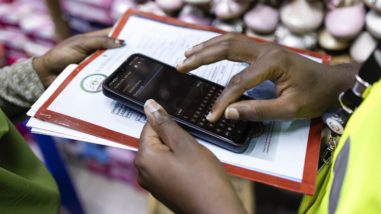Who will speak? (Photo Credit: Flickr User comedy_nose, licensed under CC BY 2.0)
Just for the sake of argument, let’s say there are two kinds of people who advocate for social change: people who are directly affected, aggrieved, involved; and people who are working on behalf of those in that first group. Sarah Brady, for example, worked tirelessly for gun control after her husband James was injured in 1981; she spoke from personal experience, with a passion born of trauma. Many other gun control advocates are consummate professionals who dedicate time and energy to the cause, but who themselves have not been directly touched by gun violence. Two types of people working toward the same goals, sometimes separately and sometimes together. But only one is telling their own story.
In international development, the “working on behalf of” crowd tends to be large and visible. A lot larger and more visible, in fact, than the people who are directly affected by poverty, exclusion, and injustice, but rarely have the resources, time, and political space to create a collective voice. Organizations staffed with advocacy professionals have, for example, been established to make the case that wealthy countries should provide more aid to improve the health of mothers and children, often on a disease-by-disease basis. Others call for better policies to help increase the yield of family farmers or provide access to clean water. There are groups advocating for equitable land rights, gender equality, protection of refugee populations, and many other good causes. Very, very few of these organizations employ, provide training in advocacy, or regularly put a microphone in front of the individuals who are directly affected by the problems they’re working to solve.
Yes, I am talking about organizations that work in the capitals of rich countries, which try to influence bilateral aid agencies. But I’m also talking about advocacy groups that operate at the national level in low-income countries, often supported by international non-governmental organizations; they, too, tend to be more “on behalf of” than “directly affected.” By and large, these organizations are set up to tell someone else’s story.
We support organizations like this, and I’m impressed by the excellent work they do and the positive impact they have. I’ve certainly been in the role of speaking for others at times in my career. I appreciate that advocacy requires more than passion and compelling personal narrative. It takes professional skills to shape viable policy options, and to develop and communicate messages that make sense within the policy community.
But there is something crucial missing—it’s the voice of people who should be setting the agenda for their own better futures, and telling their own story to educate and persuade. To me, the active participation of people who are directly affected by bad policies is essential to the most powerful and sustained kind of advocacy, the kind that will demand the right responses. And it’s just not there often enough.
I don’t know precisely how to amplify the voices of citizens who want their governments to collect revenues fairly and spend them on services that count; nor do I know exactly how to make it possible for women, alone or collectively, to speak truth to power about economic exploitation and the need to ensure that they can control whether and when to bear children.
I do know, though, that it’s worth figuring out how established advocacy organizations can do more to let people tell their own stories. Even more importantly, it’s worth finding ways to support groups of people who are working on solving problems that affect them, and who have a desire and capacity to acquire the skills of advocacy. I’d love to hear how others have done this—we have a lot to learn.



